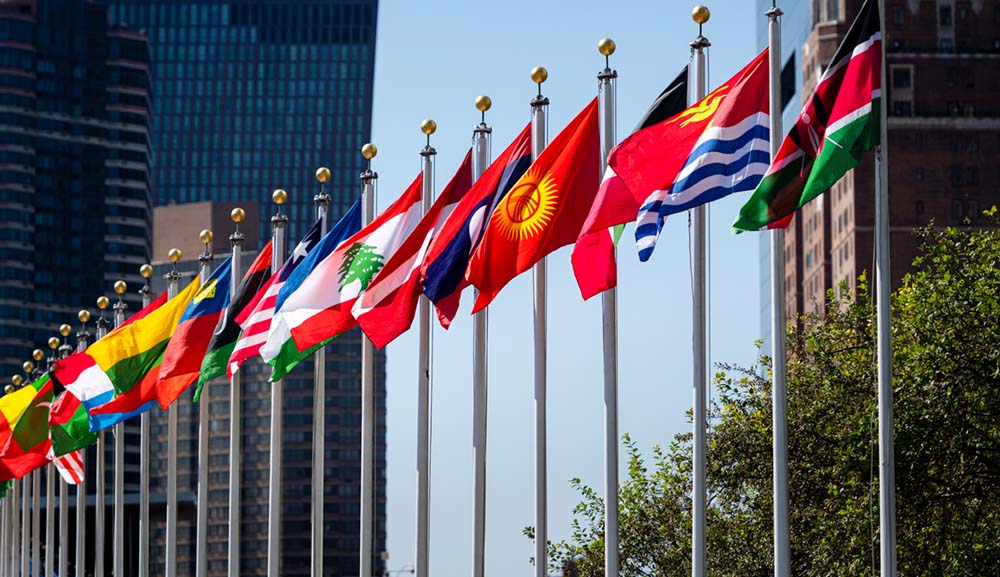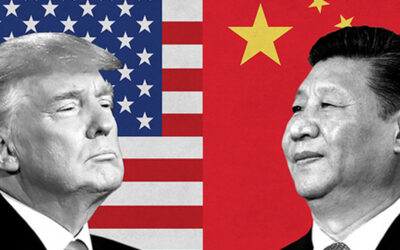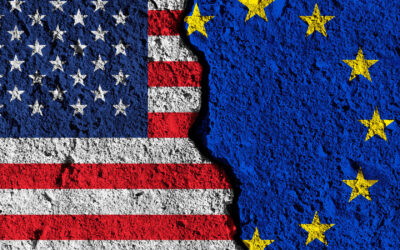In an era where the butterfly effect seems more relevant than ever, geopolitical tensions rippling across the globe are reshaping the landscape of international commerce. From the bustling ports of Shanghai to the gleaming skyscrapers of London, businesses and policymakers alike are grappling with a new reality: in today’s interconnected world, political instability and strategic rivalries have become as crucial to global trade as supply and demand.
The New Cold War: U.S.-China Tensions
At the epicenter of this geopolitical maelstrom lies the increasingly fraught relationship between the United States and China. What began as a trade dispute under the Trump administration has morphed into a multifaceted rivalry that touches every aspect of bilateral relations.
“We’re witnessing the emergence of a new Cold War,” asserts Dr. Elizabeth Chen, a senior fellow at the Peterson Institute for International Economics. “But unlike the U.S.-Soviet standoff, this conflict is playing out primarily in the economic arena.”

The implications of this rivalry are far-reaching. Tariffs imposed by both sides have disrupted global supply chains, forcing companies to reconsider their manufacturing and sourcing strategies. The tech sector has been particularly hard hit, with restrictions on Chinese companies like Huawei sending shockwaves through the global semiconductor industry.
“It’s not just about where you make your products anymore,” explains Carlos Gutierrez, former U.S. Secretary of Commerce. “It’s about whose technology you’re using, whose data you’re handling, and ultimately, whose side you’re perceived to be on.”
The Ripple Effect: Beyond U.S.-China
While the U.S.-China rivalry dominates headlines, it’s far from the only geopolitical fault line affecting global trade. The ongoing conflict in Ukraine has upended energy markets, sending oil and gas prices on a roller coaster ride that has implications for everything from manufacturing to agriculture.
“The war in Ukraine isn’t just a European problem,” notes Fatih Birol, Executive Director of the International Energy Agency. “Its effects on energy prices are being felt from Japan to Brazil, fundamentally altering the calculus for energy-intensive industries worldwide.”

Meanwhile, regional tensions in the Middle East continue to cast a long shadow over global oil supplies. The delicate dance between Iran, Saudi Arabia, and other regional powers has kept markets on edge, with each diplomatic spat or military skirmish sending tremors through commodity exchanges from London to New York.
The Brexit Factor: Redefining European Trade
In Europe, the aftershocks of Brexit continue to reshape trade patterns. The U.K.’s departure from the European Union has not only complicated its own trading relationships but has also forced a recalibration of supply chains across the continent.
“We’re still in uncharted territory,” admits Michel Barnier, the EU’s former chief Brexit negotiator. “The full implications of Brexit on European and global trade may not be fully understood for years to come.”
For businesses, this uncertainty has translated into increased costs and logistical headaches. From fisheries to financial services, companies on both sides of the Channel are still adapting to new regulations and border checks, with many choosing to relocate operations to maintain seamless access to markets.
The Rise of Economic Nationalism
Underpinning many of these geopolitical tensions is a resurgence of economic nationalism. From “America First” policies in the U.S. to India’s push for self-reliance under “Make in India,” governments around the world are increasingly prioritizing domestic interests over the free flow of goods and services.
“We’re seeing a fundamental shift away from the globalization paradigm that dominated the post-Cold War era,” observes Dr. Dani Rodrik, Professor of International Political Economy at Harvard University. “Countries are reassessing the balance between economic efficiency and national resilience.”
This shift has manifested in various ways, from increased scrutiny of foreign investments to the reshoring of critical industries. The COVID-19 pandemic has only accelerated this trend, exposing vulnerabilities in global supply chains and prompting calls for greater self-sufficiency in essential goods.
Navigating the New Normal: Strategies for Business
For businesses operating in this volatile environment, adaptability has become the watchword. Many multinational corporations are adopting a “China plus one” strategy, diversifying their supply chains to reduce reliance on any single country. Others are embracing localization, tailoring their products and operations to specific regional markets.
“The era of one-size-fits-all globalization is over,” declares Indra Nooyi, former CEO of PepsiCo. “Success in today’s world requires a nuanced understanding of local politics and culture, as well as the ability to navigate complex regulatory landscapes.”
Technology is playing a crucial role in this adaptation. Advanced analytics and artificial intelligence are helping companies anticipate geopolitical risks and adjust their strategies in real-time. Blockchain and other distributed ledger technologies are being explored as ways to increase transparency and resilience in global supply chains.
The Role of International Institutions
As geopolitical tensions reshape global trade, the role of international institutions like the World Trade Organization (WTO) has come under scrutiny. Critics argue that these bodies have been ineffective in managing conflicts between major powers, while supporters maintain that they remain essential forums for dialogue and dispute resolution.

“The multilateral trading system is under more pressure than at any time since its creation,” acknowledges Dr. Ngozi Okonjo-Iweala, Director-General of the WTO. “But it’s precisely in times of tension that we need these institutions the most.”
Efforts are underway to reform and strengthen these organizations, with proposals ranging from updating dispute settlement mechanisms to incorporating new rules on digital trade and state-owned enterprises.
Looking Ahead: An Uncertain Future
As the world grapples with these myriad challenges, the future of global trade remains uncertain. Will we see a further fragmentation of the global economy into competing blocs? Or will pragmatism and mutual interest eventually prevail, leading to new forms of international cooperation?
“The next decade will be critical in determining the shape of the global trading system for generations to come,” predicts Pascal Lamy, former Director-General of the WTO. “The choices we make now will have profound implications not just for economic prosperity, but for peace and stability around the world.”
For businesses, policymakers, and citizens alike, navigating this new landscape will require a delicate balance of principles and pragmatism, of national interest and global responsibility. In a world where geopolitical risks have become an inextricable part of the global trade equation, adaptability, foresight, and resilience will be the key to success.
As we stand at this crossroads of history, one thing is clear: the era of taking global trade for granted is over. The future belongs to those who can navigate the complex interplay of politics, economics, and culture that defines our interconnected world. In this new reality, understanding geopolitical risks isn’t just an academic exercise—it’s a vital component of global business strategy.


